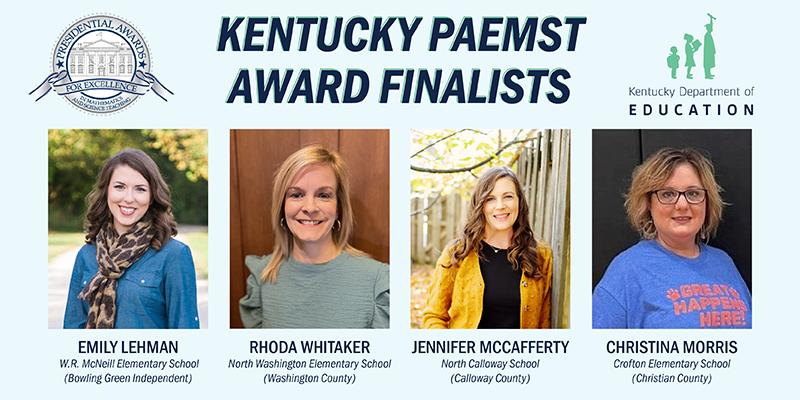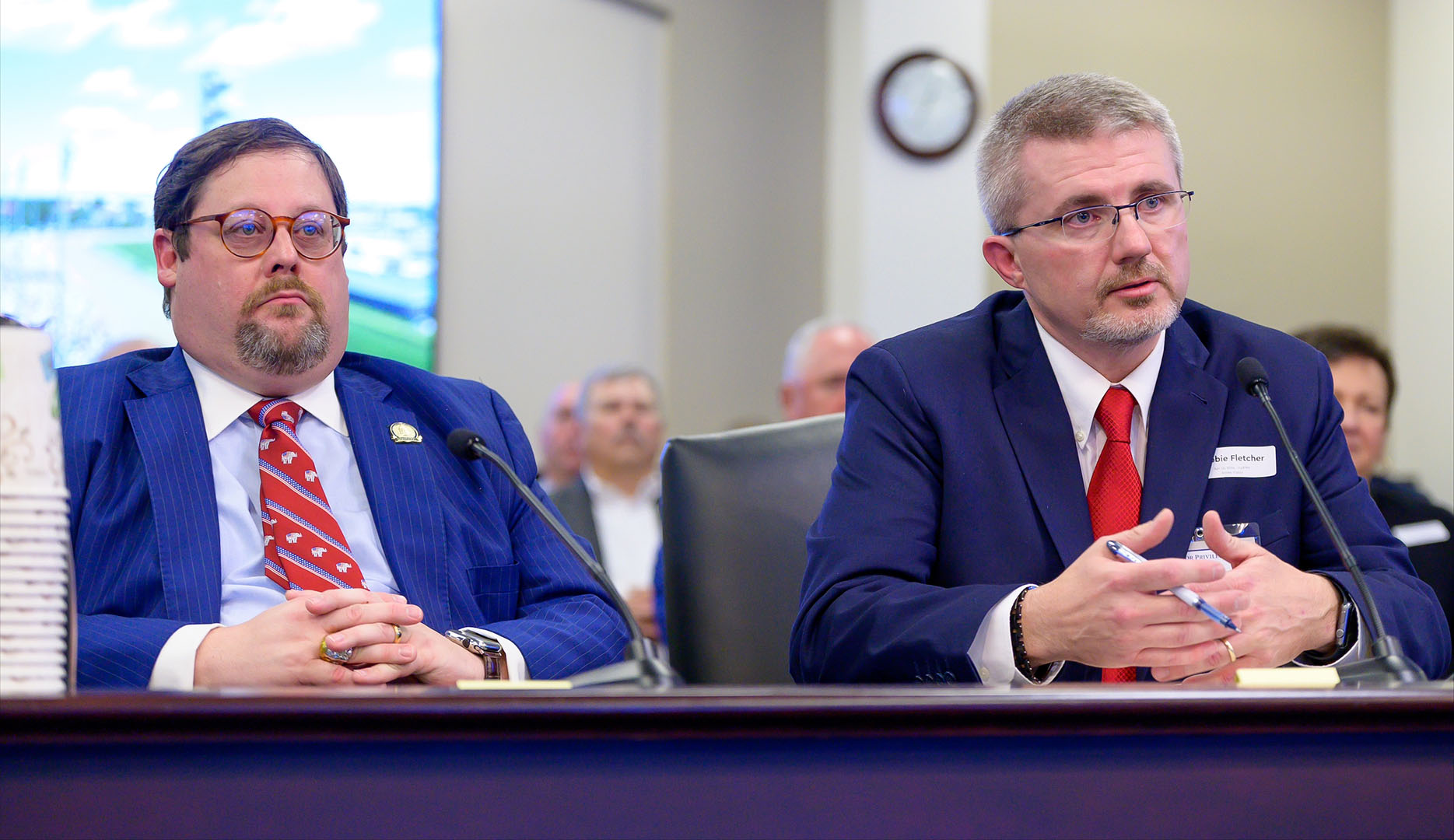By Susan Riddell
susan.riddell@education.ky.gov
In its first year, the All American Teacher of the Year Award recognizes outstanding mathematics, science and English teachers participating in the National Math and Science Initiative (NMSI) Advanced Placement Training and Incentive Program (APTIP).
Three Kentucky teachers recently received this honor:
- Dianne Beckman, a 25-year classroom veteran. She teaches Algebra 1 and Advanced Placement (AP) Calculus at Lone Oak High School (McCracken County).
- Anthony Mires, who is in his ninth year of teaching. He teaches AP Biology and Forensics at Barren County High School.
- Coury Leathers Osbourne, who is in her 10th year at Marion County High School. This year, she is teaching AP English Literature and Composition.
Why did you become a teacher?
MIRES: Education is the foundation for a successful society. There is nothing more important or fulfilling than building these foundations.
OSBOURNE: I became a teacher because I saw at an early age that it was a career that enabled someone to share their passions with others and make a difference in the lives of teenagers. In high school, I had two English teachers who were incredible role models. It was not their content knowledge that impressed me at that age – it was their sincere love of their students, their ability to challenge us beyond our own expectations and their daily positive attitudes. I wanted to be a teacher exactly like them.
What do you love most about teaching?
BECKMAN: The praise and thank yous I receive from my students who return from college to tell me how well prepared they were for college calculus.
OSBOURNE: There isn’t just one thing. I love that I may help a student discover a love of reading; I love that my job is never the same from day to day. I love that I get the opportunity to help seniors during a stressful time in their lives. I love those moments when the class is in the middle of a lesson and I suddenly realize they are truly learning and the lesson is an absolute success.
What’s the best advice you were ever given by another educator?
BECKMAN: Never stop learning.
MIRES: Value reflection. I try to keep a journal of what works and what doesn’t. As we teach we sometimes discover novel ways of communicating a particular idea but we forget to use it again or we forget the power it had.
Describe your teaching style?
MIRES: Metaphoric. AP Biology has some really abstract ideas and concepts that are difficult to visualize. I work hard to find analogies that explain these concepts. These strategies often include manipulatives and kinesthetic activities that help the students visualize what it is we are studying.
OSBOURNE: My teaching style is challenging, fun and fair. I challenge the students to think independently and analytically about literature; I include fun group activities and projects to help the content come alive for the students; and I treat all students with respect and fairness.
What’s the best tool you’ve ever used in your classroom?
BECKMAN: Graphing calculator for mathematics
MIRES: Excluding the science equipment I use, I would have to go with manipulatives. Science involves many things that move, change and react. Being able to hold models or cutouts helps students to visualize these processes.
What’s the best comment you’ve received from a student?
BECKMAN: ‘Thanks for making me work so hard in class. I’m setting the curve in my college calculus class.’
OSBOURNE: From an incredibly talented student who ended up attending Governor’s School for the Arts in creative writing and receiving a distinguished on her writing portfolio: “You will probably never realize how much of a role model you have been to me these past 4 years… To be honest, if you hadn’t told me I was a good writer, the thought would have never crossed my mind.”
What advice do you have for new or young teachers?
BECKMAN: If it’s worth doing, it’s worth doing right.
OSBOURNE: Show students respect, and they will respect you in return. Never stop learning more about your content, and never stop reflecting on your lessons and pushing yourself to be a better teacher. Don’t forget that some students have unimaginable obstacles when they leave our schools, and they carry that baggage with them to your classroom. Be patient and kind. Be prepared to take on several extracurricular activities – it always falls on the shoulders of the new teachers. Although it doesn’t seem fair, it gives you experience and gives you a chance to interact with the students outside of the classroom. It will end up making you a better teacher in the long run.
What do you love most about your school?
MIRES: We have a tremendous faculty that gets along very well because we all share an honest interest in our students and each other. As a result, we challenge students and each other to go beyond what they think they are capable of. For our students, we hopefully give them the tools to be successful after they have left us. For our teachers, it provides an atmosphere that encourages everyone to do better.
OSBOURNE: I love that my school is always looking for ways to grow and improve. My school is an old building in a small, rural community – and yet, we are constantly challenging our students academically in ways that were never heard of just 10 years ago.
What’s the most rewarding professional development you’ve ever attended?
BECKMAN: Laying the Foundation Pre-AP training (a series of labs and lessons aimed at student reflection on what they have done.)
MIRES: It (Laying the Foundation) goes farther into content detail and challenges students to think about why certain results happen. It picks up where most curricula leave off.
OSBOURNE: Serving as a reader for the AP Literature Exam for the past three years.
If you could say one thing to all Kentucky teachers, what would it be?
MIRES: As I talk with other teachers about students and classrooms around the nation, I become more and more impressed with what is going on in our state. We have eager, passionate students who respond to eager, passionate teachers. It has been my experience that students from all backgrounds like to be challenged whether they communicate it or not.
OSBOURNE: Our students are just as capable and intelligent as students from all across the world. We just have to push them to their limits so that they prove it to us.
Where do you see Kentucky education in five, 10 years?
BECKMAN: In five years, more high school students will be taking and passing AP courses and exams due to Advance Kentucky grant incentives. In 10 years, technology will take over with each student at all grade levels with a computer. Instruction and student work will be submitted online.
MIRES: I feel that there is a shift toward developing teaching communities. I hope to see more opportunities for teachers to have the time and resources to share and learn from each other. We teach too much in isolation. I also hope to see an increased emphasis on science and math programs throughout the state. Our future depends on these two areas. I have witnessed firsthand the power of programs like NMSI and Advance Kentucky that have really made an impact on the schools involved, and it has raised the bar on what we see as proficiency.
MORE INFO …
Dianne Beckman, dianne.beckman@mccracken.kyschools.us, (270) 538-4150
Anthony Mires, anthony.mires@barren.kyschools.us, (270) 651-6315
Coury Leathers Osborne, coury.osborne@marion.kyschools.us, (270) 692-6066






Leave A Comment